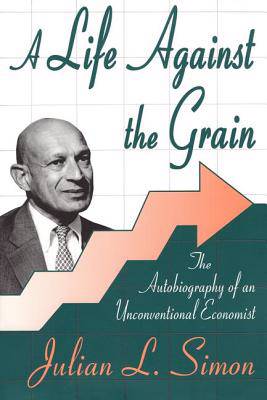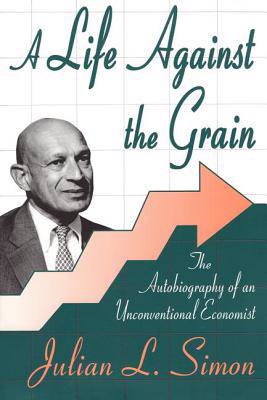
- Afhalen na 1 uur in een winkel met voorraad
- Gratis thuislevering in België vanaf € 30
- Ruim aanbod met 7 miljoen producten
- Afhalen na 1 uur in een winkel met voorraad
- Gratis thuislevering in België vanaf € 30
- Ruim aanbod met 7 miljoen producten
A Life Against the Grain
The Autobiography of an Unconventional Economist
Julian L SimonOmschrijving
In his long and distinguished career as a writer and scholar Julian Simon came to be known as one of the leading--and most controversial--authorities on population economics. An immensely productive writer, his work is unified by a basic core belief: that human intellect and ingenuity are ever-renewable resources in the use and preservation of natural resources. Inevitably, Simon's position provoked the hostility of doctrinaire environmentalists, both in academia and in the movement at large. However, Simon's arguments were invariably built from facts and powerful evidence that stood him well in many high-profile public debates. The first part of Simon's autobiography takes the reader through his childhood, his years as a midshipman and then as an officer in the Navy, plus a stint in the Marines, and his experiences as a copywriter in an advertising firm. Simon's plan after receiving his Ph.D. from the University of Chicago was to be an entrepreneur, which would afford him enough money to care for his parents and allow him free time for writing fiction. He ran a small mail-order business for two years, during which time he wrote his first book, How to Start and Operate a Mailorder Business, which has since gone through seven editions. Deciding to seek a professional career, in 1963, he accepted a position at the University of Illinois. Although he spent thirty-five years of his life as a faculty member at three universities, his autobiography contains almost no discussion of departmental affairs or university politics, topics about which Simon had little or no interest. Rather, after the personal chronology and experiences, the book includes substantive chapters on research methods, population economics, and immigration. It also explains how Julian Simon became the economist he was. He analyzes crucial periods in his life when he developed his ideas on fundamental issues. Written in an engaging and amusing manner, Julian Simon's autobiography is a combination of personal memoir and professional contribution to important ideas in economics, research methods, and demography. His observations and personal reflections will interest the general reader on a humanitarian level as well as environmentalists, sociologists, and economists on a professional level.
Specificaties
Betrokkenen
- Auteur(s):
- Uitgeverij:
Inhoud
- Aantal bladzijden:
- 378
- Taal:
- Engels
Eigenschappen
- Productcode (EAN):
- 9780765805324
- Verschijningsdatum:
- 30/09/2003
- Uitvoering:
- Paperback
- Formaat:
- Trade paperback (VS)
- Afmetingen:
- 150 mm x 235 mm
- Gewicht:
- 576 g

Alleen bij Standaard Boekhandel
Beoordelingen
We publiceren alleen reviews die voldoen aan de voorwaarden voor reviews. Bekijk onze voorwaarden voor reviews.











